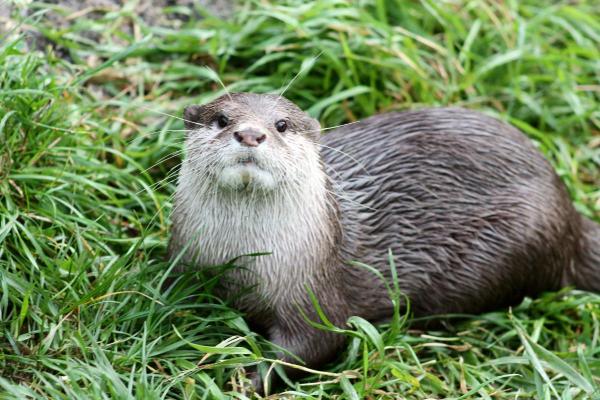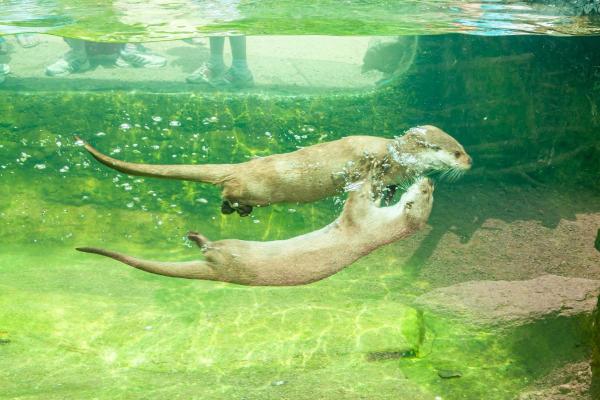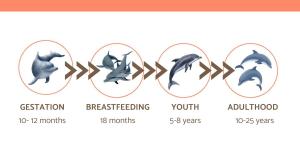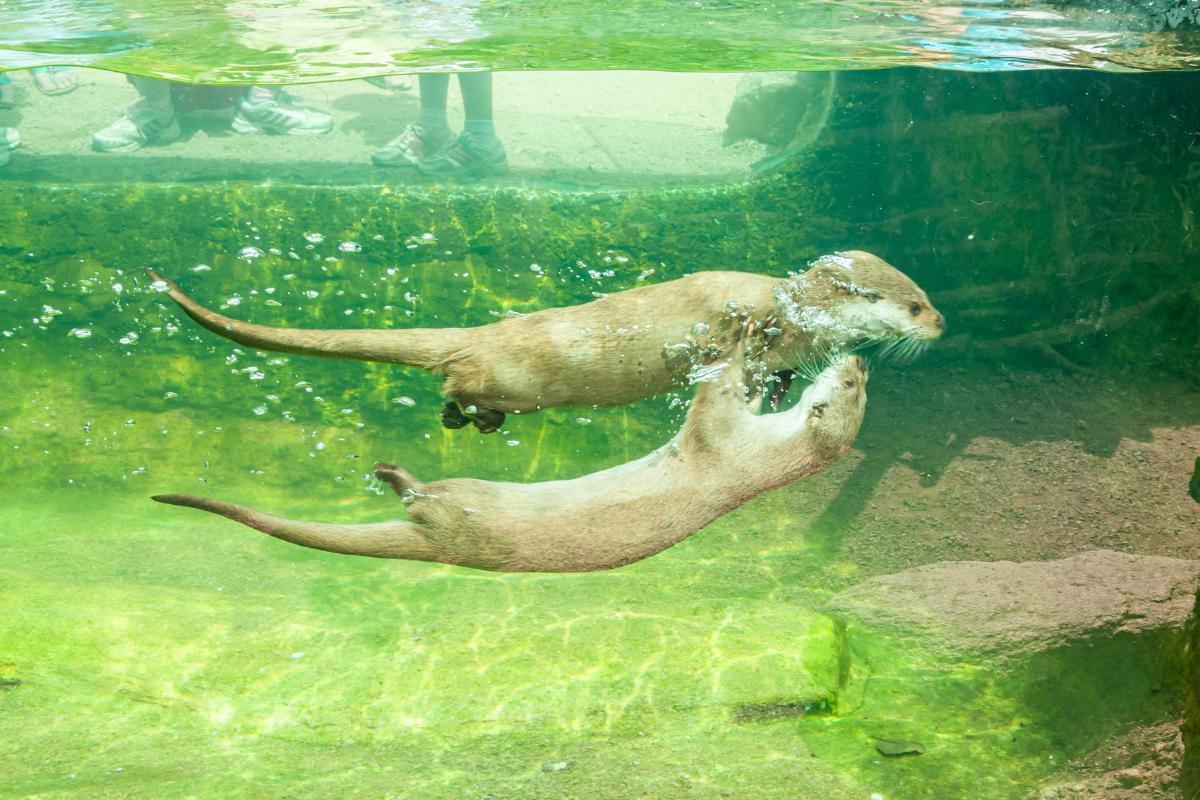How Long Do Otters Live? - Otter Lifespan


Otters, belonging to the family Mustelidae, are indeed semi-aquatic mammals known for their playful behavior and adaptability. They are often referred to as the "clowns of the rivers" due to their entertaining antics in the water. Otters are highly skilled swimmers and have evolved to thrive in various aquatic environments, from freshwater rivers and lakes to coastal areas and even marine environments, depending on the species.
The following AnimalWised article delves into the lifespan of otters, their life cycle, and the challenges they encounter in the wild.
How long do wild otters live?
Otters live unique lives, with varying lifespans depending on their species and the environment they inhabit. While there's no one-size-fits-all answer, most otters can expect to live around 15 years on average. However, this lifespan can be influenced by a multitude of factors that shape their existence in the wild.
- River Otter (Lontra spp.): these freshwater otters typically enjoy a lifespan of 8 to 12 years in their natural habitats. However, some individuals have exceeded expectations and lived up to 20 years.
- Sea Otter (Enhydra lutris): sea otters tend to live longer. In the wild, they usually reach 10 to 15 years of age. Yet, under controlled conditions, some sea otters have defied the odds and lived beyond their 20s, earning their place among the longest-lived otters.
- Giant Otter (Pteronura brasiliensis): native to South America, giant otters have a lifespan ranging from 8 to 10 years in the wild. Although some individuals have been registered to live up to 15 years.
- Asian Small-Clawed Otter (Aonyx cinereus): this small and social otter species, native to parts of Asia, typically has a lifespan ranging from 5 to 8 years in the wild and up to 10 years in controlled environments.
- North American River Otter (Lontra canadensis): these semi-aquatic mammals found in North America tend to live around 8 to 9 years in the wild. However, those living in protected environments or wildlife reserves may reach 20 years or more.
- European Otter (Lutra lutra): the European otter, native to Europe, can live for about 8 to 10 years in the wild. In regions with stable populations and minimal human disturbance, some individuals have been known to reach 12 to 15 years.
- African Clawless Otter (Aonyx capensis): these otters, found in various parts of Africa, typically have a lifespan of 8 to 10 years in the wild. However, in captivity or safe environments, they may exceed this range and reach up to 15 years.
It's crucial to remember that otters' lifespans are not set in stone. They are influenced by various factors, including food availability, habitat quality, threats from predators, overall health, and susceptibility to diseases. Additionally, human activities like habitat degradation and pollution can pose risks to these delightful creatures, affecting their longevity.
For more in-depth information about various otter species, don't miss our other article. In it, we provide details on different types of otter species along with photos to help you understand their similarities and differences.
How long do domestic otters live?
Otters aren't typically considered as pets in most countries. They are best suited to their natural habitats. However, in specific places like wildlife conservation centers, educational facilities, and rehabilitation centers, otters are cared for in controlled environments. These facilities operate under strict regulations and guidelines to ensure the otters receive proper care and live in environments that resemble their natural homes.
In these carefully controlled settings, where otters receive veterinary care and balanced diets, their lifespan can increase by 15 to 20%.
Can you keep an otter as a pet?
It's essential to emphasize that keeping otters as pets in homes is problematic and, in many places, illegal. This is due to the unique care needs of otters and the conservation concerns associated with domestication. Otters have specific behaviors and requirements that are challenging to meet in a home setting, which can lead to problems for the animal, its owners, and the community.
The restricted handling and regulation of otters are in place to protect these animals and their natural habitats. By supporting reputable conservation organizations and educational facilities, individuals can contribute to the well-being of otters and help ensure they continue to thrive in their natural environments.
To delve further into the topic of otters as pets, we invite you to read another article where we explore the possibility of having an otter as a pet. We thoroughly examine the legal and practical reasons why this might not be the best idea, providing valuable insights into the matter.

What threats do otters face in the wild?
Otters, like many wild animals, face a variety of threats and causes of death in their natural habitats. Some common causes of otter mortality include:
- Predators: young otters, in particular, are vulnerable to predation by larger carnivores, such as eagles, alligators, and larger mammals.
- Disease: otters can be susceptible to various diseases, including parasitic infections and diseases transmitted by other wildlife or contaminated water.
- Accidents: otters may be injured or killed in accidents, such as collisions with boats, entanglement in fishing gear, or becoming trapped in unnatural obstacles.
- Habitat loss: habitat destruction and pollution, often caused by human activities, can impact otters by reducing their access to clean water and prey.
- Pollution: pollution from industrial, agricultural, and urban sources can contaminate otter habitats and harm otters directly through water pollution or indirectly by reducing prey populations.
- Illegal wildlife trade: otters, particularly in some regions, are targeted by illegal wildlife trade for their fur, body parts, or as exotic pets. This can lead to population decline and death for captured individuals.
- Food shortages: fluctuations in prey availability can affect otters' nutritional health and survival, especially during periods of scarcity.
- Natural disasters: events like floods, hurricanes, and other natural disasters can disrupt otters' habitats and lead to injury or death.
Conservation efforts aim to address many of these threats and protect otter populations. In order to minimize some of the causes of otter mortality, we can protect their habitats, regulate trade, and raise awareness about the importance of these animals in their ecosystems.
How is the otter life cycle?
The life cycle of otters comprises various stages, spanning from birth and early development to reproduction and raising offspring.
It all commences with the birth of young otters in burrows or dens, typically located near water sources. These dens provide essential security and shelter for the newborn pups, which are classified as altricial, meaning they are born in a state of extreme vulnerability, characterized by blindness and undeveloped motor and sensory skills.
During the initial weeks of life, these infant otters rely entirely on their mother for sustenance and protection. The mother nurtures her young through breastfeeding and maintains a constant watch over them within the den. As the pups grow, their eyes open, and they start to explore their immediate surroundings.
Their dependence lasts for several months, typically around 3 to 4 months, but can vary depending on the species of otter and environmental conditions.
The number of pups in a litter can vary depending on the otter species. For instance, river otters can have litters ranging from one to six pups, while sea otters typically have one to three offspring in a litter.
As they mature, they begin to accompany her in the search for food and acquire the essential survival skills specific to their habitat. With time, these young otters become more self-reliant and embark on independent exploration and hunting, ultimately reaching adulthood.
Once they attain sexual maturity, otters seek out mates for reproduction. River otters typically attain sexual maturity at around 2 to 3 years of age, while sea otters may take 3 to 5 years to reach this stage.
The timing of the breeding season varies among species, influenced by environmental conditions and resource availability. River otters typically breed in late winter to early spring (February to April), sea otters in spring to early summer (April to June), and other otters species may not have a fixed breeding season and can reproduce throughout the year. Some species may also engage in reproduction once or twice a year, depending on these factors.
Don't miss out on our additional article where we explore how otters sleep. We uncover their unique behaviors and adaptations that enable them to thrive in their aquatic habitats, providing a fascinating glimpse into their lives.
If you want to read similar articles to How Long Do Otters Live? - Otter Lifespan, we recommend you visit our Facts about the animal kingdom category.
- Melquist, WE, & Hornocker, MG (1983). Ecology of river otters in west central Idaho . Wildlife monographs, 3-60.
- Reed-Smith, J., & Larson, S. (2017). Otters in captivity . Marine mammal welfare: human induced change in the marine environment and its impacts on marine mammal welfare, 573-584.
- Rheingantz, ML, Leuchtenberger, C., Zucco, CA, & Fernandez, FA (2016). Differences in activity patterns of the Neotropical otter Lontra longicaudis between rivers of two Brazilian ecoregions . Journal of Tropical Ecology, 32(2), 170-174.






